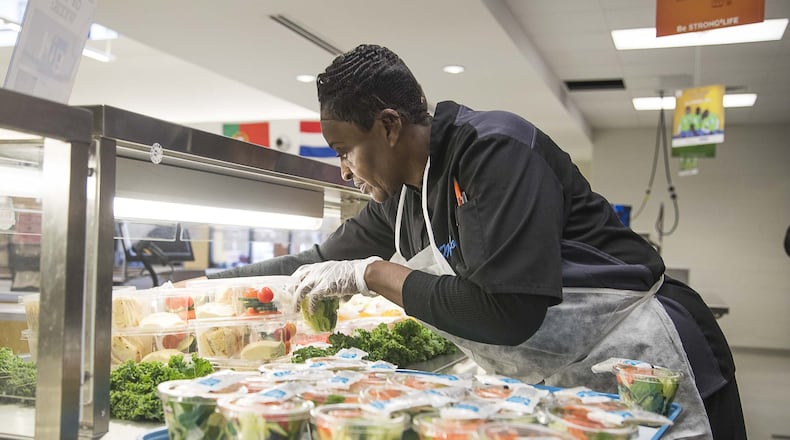Students and families across metro Atlanta who owe their schools lunch money will return to classes from winter break with no debts.
The nonprofit All for Lunch cleared lunch debts at nearly 300 schools, including all public schools in Bartow, Fayette, Forsyth and Fulton counties. The organization paid the debts at all public elementary schools in Cobb and Gwinnett counties.
“The whole mission is to make sure children have access to lunch at school, regardless of financial circumstances out of their control,” Alessandra Ferrara-Miller, founder of All for Lunch, said.
She got the idea for the organization after seeing a 2016 news report about a student in Alabama whose arm was stamped with a reminder about owing lunch money. She said her heart broke imagining how a small child would feel not receiving a meal or being embarrassed in front of their classmates.
“School lunch is $2.50 or $3 per meal,” Ferrara-Miller recalled telling herself. “There has to be a way we can help these kids.”
Her eldest child was a student in a Gwinnett County school, and she started by raising a few hundred dollars to pay off lunch debts at the four elementary schools in the North Gwinnett cluster.
Credit: Courtesy of Alessandra Ferrara-Miller
Credit: Courtesy of Alessandra Ferrara-Miller
That’s grown into the nonprofit’s recent donation of more than $125,000 across metro Atlanta.
While bringing in more donations from more donors, All for Lunch has otherwise remained mostly the same. Ferrara-Miller runs the one-person operation in her spare moments before and after work. There are no operating costs, so all donations go to school lunches.
The mission has spread by word-of-mouth, eventually reaching larger local nonprofits and donors across the region.
Her efforts ramped up this school year because of the expiration of the federal pandemic waiver that allowed for school meal programs to provide meals for free to all students, regardless of income, for nearly two years. She got a major boost from the Kincaid & Dallas morning show on the New Country 101.5 radio station.
The show interviewed school administrators and nutrition staff about the challenges students bring to the cafeteria and feeling anguish when they’re unable to help, host J.J. Kincaid said.
“Those stories really resonated,” he said. They played interviews every hour and would immediately hear from people wanting to donate.
“One thing we harped on is this affects all types of people and all types of backgrounds. For many, all it takes is one major medical emergency, and you’re in debt,” Kincaid said. “Unfortunately, that can trickle down to food scarcity for kids.”
Ferrara-Miller noted that programs for free and reduced lunch can still leave out needy families. A family of four must make $36,075 or less this year to receive free school meals or up to $51,338 to get reduced-price meals. Schools try to reach all eligible families, but some decline to sign up over fears related to immigration status or other concerns.
As All for Lunch has grown, the organization has increasingly paid for lunches in advance. With some schools, Ferrara-Miller said, she has provided money that staff can use when a student goes through the line and cannot pay at the register.
To learn more about the organization or to provide a tax-deductible donation, visit allforlunch.org.
About the Author
Keep Reading
The Latest
Featured


